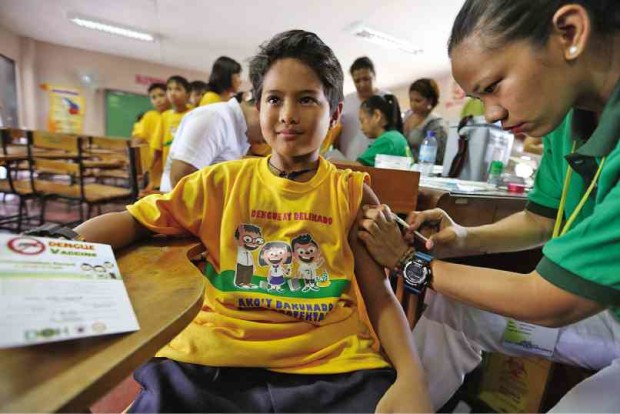
In this April photo, a student of Parang Elementary School in Marikina City is injected with the dengue vaccine. —INQUIRER PHOTO
The House of Representatives’ health committee has deferred to next week its investigation on the Department of Health’s program to vaccinate public school children against dengue.
This was after 1-SAGIP Party-list Rep. Rodante Marcoleta demanded that the resource persons invited to the hearing secure first the approval of their respective agencies before they speak to the committee.
Marcoleta also described as “fishy” the fact that the committee did not schedule former Health Secretary Janette Garin to speak during its first hearing set today.
“I move that we defer this inquiry because the very person, the most important person involved in this inquiry, was not invited,” he said less than 10 minutes after the resource persons were recognized.
“There’s something fishy here. We should begin the investigation [or] inquiry at the presence of the person involved with this inquiry,” he added.
The committee thus moved to adjourn the Monday hearing and hear the matter again on Nov. 29.
Garin was originally invited to the Nov. 29 hearing, but attended today’s hearing anyway to manifest that she was supposed to go abroad from this week until Christmas.
Since the hearing was cancelled, she said she would be willing to fly back to the country next week at her personal cost “for purposes of transparency.”
“I will take full accountability. I would just like these people spreading misinformation to take accountability,” Garin said. “It will be an injustice for our children to be misled, to be taken out of this program only to suffer from infectious diseases that’s been killing hundreds.”
Philippine Health Insurance Corp. independent director Anthony Leachon also made his disappointment known to the congressmen since he was not able to speak out.
Leachon was supposed to elaborate why he pushes for the suspension of the supposedly “rushed” immunization program until the vaccine has been thoroughly studied.
“I thought this was an august body where ordinary Filipino citizens can speak up about their knowledge. I hate to say this, but this is a disappointment for me,” he said.
Not invited
Quezon City 4th District Rep. Angelina Tan, author of House Resolution No. 444 and committee chair, explained that her decision to invite Garin to the second hearing was her way of organizing the turns of various resource persons to speak.
Tan said that instead of Garin, she wanted to hear first the thoughts of “people on the ground,” including the members of the Food and Drug Administration that approved the tetravalent dengue vaccine manufactured by Sanofi-Pasteur.
Tan told reporters that she was just wanted to ensure the resource persons would be able to speak without having to mind other officials present during the hearing.
“My fear was that if everyone’s around … I don’t know what they’d say. So, all I want is they will answer based on their conscience,” she said in an interview.
Yielding to her colleague’s move, Tan said it would be better to postpone the hearing since emotions have been running high. “Let’s allow things to cool down,” she said.
Garin, meanwhile, stressed to reporters that the investigation should be transparent.
Alluding to Marcoleta’s request, Garin said: “It’s easy to say I represent Philhealth. A while ago, we were calling Philhealth; they said they were not invited. It’s easy to say Monetary Board. What does the Monetary Board have to do with vaccination? It’s easy to say I represent [the Philippine College of Physicians. But, [they] sent notice that they were not officially invited and they have not designated anybody to speak here.”
She was apparently referring to Leachon, the president of PCP who sits at Philhealth as the MB’s representative. Leachon joined five others in the medical sector in submitting a position paper against the program over supposed uncertainty in the vaccine’s safety, and lack of cost-effectivity.
Vaccine efficacy
In filing the resolution that paved the way for the House inquiry, Tan raised several questions against the dengue vaccination program.
Tan cited “groups” that questioned the vaccine’s safety and efficacy, especially as the immunization program targets school children above the Grade 4 level. She also pointed to possible conflict of interest and the alleged railroading of the vaccine’s approval by the FDA, as well as procurement lapses on the government’s part.
Sanofi-Pasteur external affairs head Gerrard Paez said the pharmaceutical firm would have wanted to take the opportunity to present their side in the investigation.
The firm’s medical director, Ruby Mendoza- Dizon, said that of the 489,000 children vaccinated so far by the government, only less than 1 percent had experienced side effects, which are also similar to those encountered with most vaccines.
Dizon stressed that the firm has completed its efficacy trials, which is required before the vaccines can be approved by regulatory authorities.
The FDA’s approval process took almost a year from January to December 2015, while the DOH’s public vaccination program began rolling out in April.
“We have the facts, we have the medical background, we have the scientific basis to say this is a medically safe vaccine. This was supposed to be our chance. But, obviously we will be back,” Paez said.